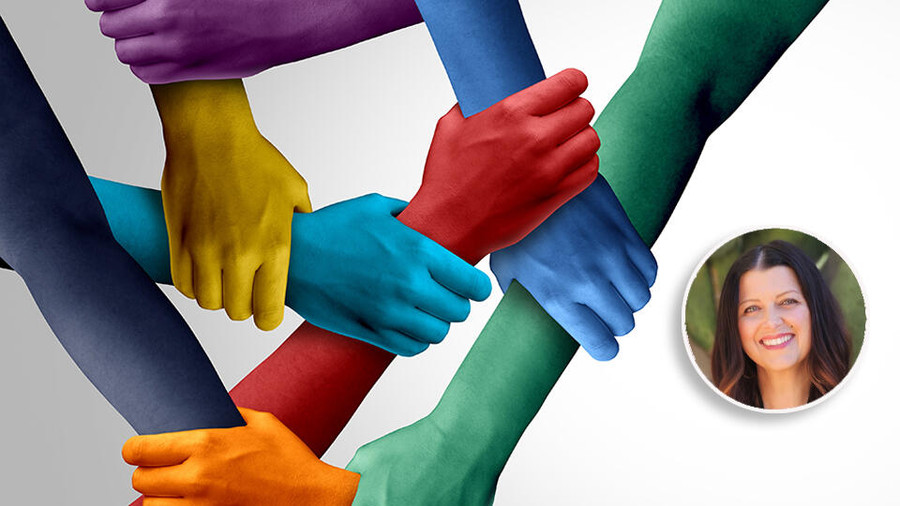2025 has kicked off with a series of unsettling events. Tension and anxiety are high across North America as the unknown impact of tariffs, climate change and attacks on human rights loom ominously. In times of unrest, seeking pleasure is not frivolity but necessity. We need connection, self-care and joy more than ever as an antidote to social and economic problems that largely feel out of our control.
Let’s look at how we, as pleasure professionals, can amplify our inclusivity efforts to create safe spaces in our work environments, through our social media feeds and in our customer interactions.
While orgasms may not offset the onslaught of unsettling changes and economic uncertainty ahead, they certainly offer an enticing alternative to doomscrolling.
Rise to the Challenge
Inclusivity is a long-standing pleasure industry tradition. In the wake of the social upheaval of the 1960s, pleasure retailers of the 1970s — like Good Vibrations and Eve’s Garden — pioneered a movement toward increased inclusivity in the sector. The change they inspired continues to drive packaging, messaging and product design decisions even today — and it is incumbent upon us to maintain that momentum, especially now that the need for inclusivity has become even more pressing.
In recent years, millennials have gained the nickname “the burnout generation,” while Gen Z has been labeled “the anxious generation.” Now, with growing attacks on bodily autonomy, reproductive rights, queer and trans rights, and the recent defunding and erasure of diversity, equity and inclusion efforts across the U.S., even more people are experiencing high levels of stress. Self-care, community engagement and connection are therefore of the utmost importance. If ever there was a time to promote the physical, emotional and mental benefits of orgasms, masturbation, intimacy and sex, that time is now.
Walk the Walk
Understandably, businesses can be reluctant to address social inequities or political unrest head-on. Nobody wants to alienate customers who might hold opposing views. However, brands can embrace inclusivity in tangible ways and express clear support for targeted communities without making overtly political public statements.
Start by evaluating your company’s inclusivity policies and initiatives to make sure they authentically align with your brand’s values. Do your policies recognize and protect gender diversity and inclusion? Do they nurture diversity through hiring and internal practices? One important example is providing health coverage and offering family leave that explicitly includes all families. Concrete efforts to support your team members can help ease anxiety in the workplace.
Customer-facing inclusivity is equally crucial. As an industry, we must remain committed to advertising and packaging that represents all bodies, marketing campaigns that speak broadly to the benefits of pleasure for all, and product design enhancements that meet the needs of our increasingly diverse customers. With diversity under attack, representation matters even more.
Stand United
The pleasure industry is not alone. Many other interest groups and movements share our priorities and are aligned with our efforts to combat stigma, increase acceptance and raise awareness of the benefits of pleasure and sexuality. This makes menopause, disability, mental health, racial justice and gender-affirming care advocates and supporters our natural allies, as those issues intersect with the sex-positivity movement and overlap with our customers’ interests and values. Amplifying relevant conversations and diverse creators through social media, in-store events, cause alignment efforts, product partnerships and fundraisers is an effective way to demonstrate solidarity with the causes that matter to your brand and customers. Let 2025 be the year we all unite in a mission to share the message that sex can improve your life.
Stay on Message
Whether your brand reaches your customers through in-person interactions, a website, Facebook groups, mainstream publications, webinars or e-blasts, keep reminding your customers of the power of pleasure. Thanks to endorphins and hormones like oxytocin released in the arousal process, a fulfilling sexual life can reduce stress, combat anxiety and depression, enhance connection and boost self-esteem. While orgasms may not offset the onslaught of unsettling changes and economic uncertainty ahead, they certainly offer an enticing alternative to doomscrolling.
Over the years, our industry has made significant inroads toward inclusivity and creating safe spaces for people to explore the most vulnerable parts of their humanity. As the climate of uncertainty continues to impact people’s mental health, the business of pleasure can offer a respite from the gloom by offering tools for increasing pleasure, connection and joy in people’s lives. This is the work that drew me and so many others to the industry. In the days ahead, it may be helpful to remind ourselves of why we love what we do and let that guide us through the challenges, so we can support and uplift the people we work with, sell to and care about.
Sarah Tomchesson (she/her) has spent much of her career as a brand strategist shaping legendary pleasure brands, including her current role as the marketing director for Magic Wand. She is a certified sexuality educator and intimacy coach and co-hosts a weekly podcast, “F*ck Yeah.” Tomchesson also serves as vice chair of the board of directors of SIECUS — Sex Ed for Social Change, the nation’s leading organization advocating for sex education policy reform.







